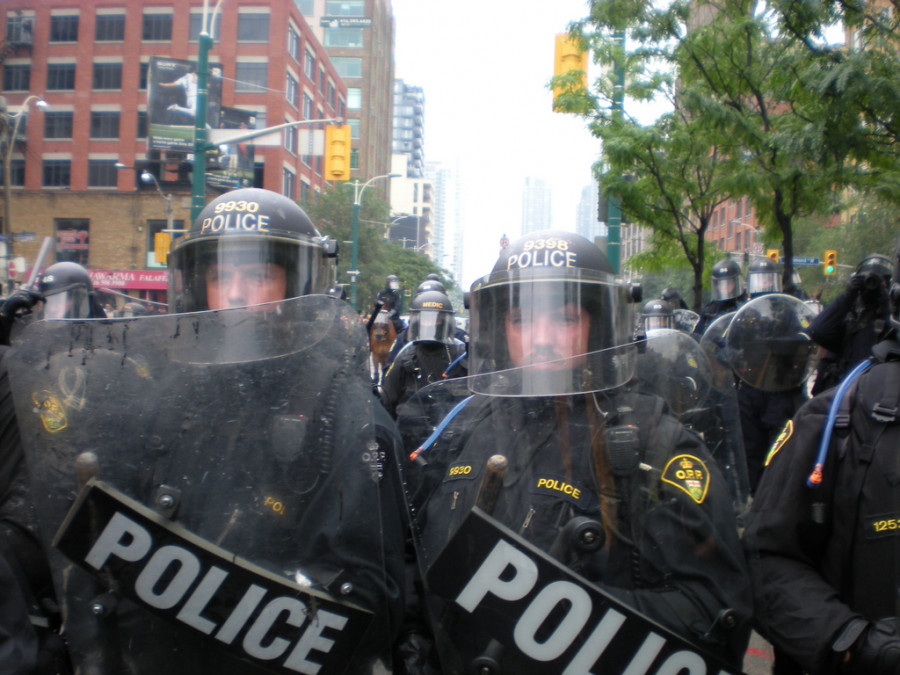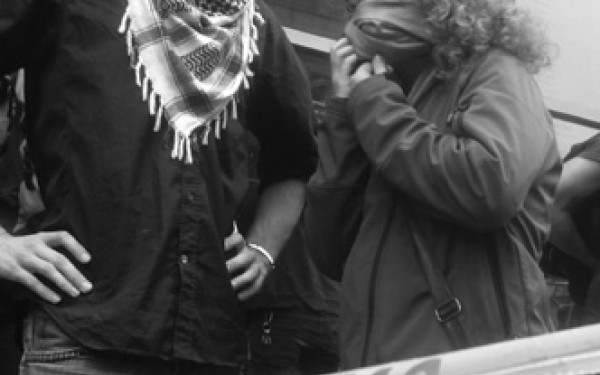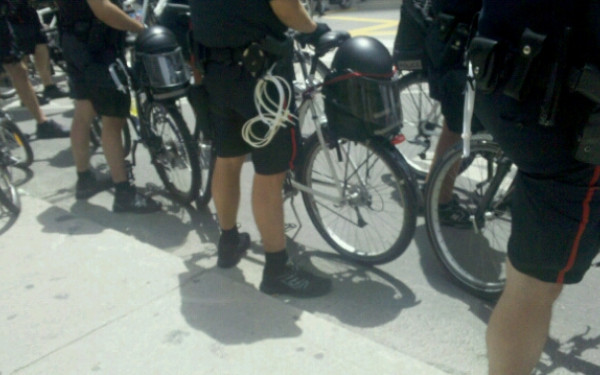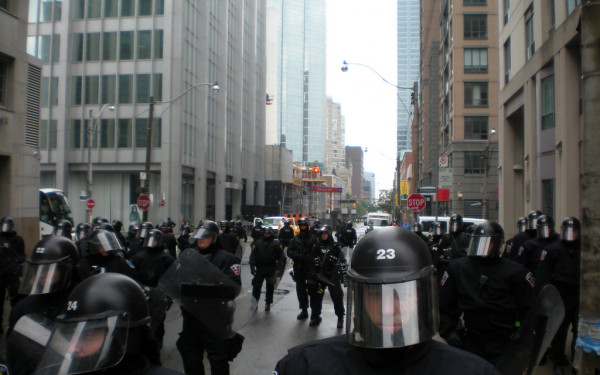‘I saw more than I wanted to see’
The story behind the detainees at 629 Eastern Avenue
Lost, hungry, cold and scared they left the makeshift detention centre at 629 Eastern Ave. one-by-one. To greet them were strangers who had come with food, drinks and clothes.
Over six hours on the night of June 27 we spoke to nearly 120 of the detainees to leave the Toronto Film Studio, a sound stage retrofit with cages to hold people arrested during the G20 summit. Although each had a different story to tell, the larger picture remained constant.
“It felt like a sociological experiment,” said Dina Dineska, who moved to Canada at the age of eight from Macedonia. Dineska was held for 19 hours after being arrested outside the Novotel Hotel on the evening of June 26. She went down to the Novotel to see what the commotion was about. “I can’t believe this is Canada.”
While released detainees and supporters waited across the four-lane avenue from the detention centre for friends, comforting each other, dozens of riot police stood waiting. At times, bright headlights from rented police Dodge Caravans shone onto the crowd.
“Get back from my car. We need to keep them visible,” answered a female police officer in riot gear, when asked why she was shining her lights on recently released detainees.
Despite being shaken, and fearing that the looming police might attack her again, Dineska told her story.
She was held in a cage with 30 other women for 19 hours, given only six Dixie-sized cups of water, and fed only once: a stale hamburger bun with soy cheese and a centimeter of margarine in it. No water was provided with the sandwich, many felt nauseous and some induced vomiting.
When Dineska went to the bathroom (a portable toilet in the corner of the cage with no door) the male police officers looked at her. She was forced to request toilet paper one square at a time.
She was never given a phone call and legal counsel was only provided as she was released.
Describing herself as apolitical, Dineska was charged with a breach of the peace. After her wrongful arrest, she said that she would no longer ignore politics.
Brian Williams, a 25-year-old from Guelph, Ontario, was also swept up in the largest mass arrest in Canadian history.
“They gave us no opportunity to leave,” said Williams, who was also arrested outside the Novotel.
“The demonstration on the Esplanade [the area outside the Novotel] was peaceful. It was like an old sit in,” wrote respected TVO reporter Steve Paikin on Twitter. Paikin was forced to leave the Novotel or face arrest. Many of the people sitting outside the Novotel were not given the same choice.
Williams was arrested when the police told the crowd that if they lined up and walked through a gap in the police lines they would be allowed to leave. As people walked forward they were swarmed by riot police and arrested.
“It was a trick,” said Williams, who spent 25 hours in police custody.
Given three cups of water throughout his day in jail, Williams also received no phone call. With the air conditioning running at a reported 11 degrees, the cells were freezing. Detainees were stripped of all but their underwear, pants and a t-shirt. Women were made to remove their bras. Bright lights were also kept on at all times, making sleeping on the freezing floors next to impossible. Many detainees left the centre disoriented with little sense of time.
With no beds, pillows or blankets in their cages, detainees also faced floors covered in dirt, vomit and the green powder of paint balls fired by police to mark people in crowds for arrest.
“It’s just made me paranoid,” said Williams, who was released at around 10:00 p.m.
Katherine Ruault woke up at 9:00 a.m. on June 26 with several guns and tasers pointed at her. She was sleeping on the floor of a University of Toronto gym with 120 other Montrealers.
Called a “liar” and “ugly as a dog” by police, Ruault was charged with illegal assembly as the dangerous items on her were confiscated: her first aid kit, her money, her cell phone and her wallet.
Catherine Mailloux found herself in much the same situation, but her money, cell phone and wallet were not returned to her when she was released. They had gone missing while in police custody. She had been lost in Toronto, without access to friends or any identification.
Faced with more than a hundred detainees from Montreal, most of whom did not speak much English, Mailloux said that the Toronto Police Service had called in the Montreal Police—a large contingent of which was in Toronto providing support during the G20.
“The Montreal Police were much nicer than the Toronto ones,” said Mailloux. “But they seemed confused. They didn’t understand the situation and why we were being arrested.”
Most of the victim of mass arrests had been transported to the detention centre by buses belonging to the Toronto Transit Corporation marked “Special,” or “Charter,” and upon release reacted to the semi-industrial with the same question: Where are we?
Twenty city blocks from the nearest subway station, Pape, the detainees exiting the detention centre were offered car rides from civilians who arrived all night to shuttle people away.
A well-known sex columnist known as Sasha (syndicated to the Montreal Mirror, among other publications), was one of the people who came down to help.
“I couldn’t believe what was happening,” she said. “So I made food and brought it down.”
As the crowd waited, the same three words were repeated over and over: Novotel, Spadina and UofT. The three locations where most of them were arrested.
Jordan Russel, 27, was arrested on Saturday afternoon around 4:00 p.m. outside St. George subway station in downtown Toronto. His crime: he was wearing dark clothes.
“I was arrested by the fashion police,” said Russel. “I had on my dark pants, with my black shirt and my lab goggles. This is how I dress every day.”
Charged with conspiracy to disturb the peace, Russel was released after eight hours. He was provided with no food, water, phone call or legal counsel while in custody.
Annabelle, 18, was in Toronto for the G20 from Montreal. She was arrested at 11:30 a.m. on June 27 as she walked away from the community centre where she had been sleeping.
It felt like a sociological experiment.
“I heard that everyone at U of T was arrested so I decided to leave the centre,” she said. “As I was walking, 20 cops came up on me and arrested me.”
Though charged with weapons possession and being masked, Annabelle said she had neither.
Kept alone in a cage at the detention centre for more than an hour, Annabelle said she was moved after police found her crying. Given two sandwiches, two glasses of water and allowed to call her lawyer, she considered herself lucky during her 12-hour stay.
Annabelle said that police knowingly kept a 16-year old in a nearby cell with adults. She also reported that one detainee’s request for an insulin injection took four hours to fulfill.
“I was extremely surprised by the treatment in there,” Annabelle said while nearly in tears. On her release she also found that her wallet, identification and cell phone had gone missing.
Simon, 24, was arrested in downtown Toronto with camping gear on his back.
“I came here as an observer,” said the Montreal native. “I saw more than I wanted to see.”
Vincent, also from Montreal was angry at the treatment he received. “What a fucking waste of time.”
By 1 a.m., nearly a dozen French Canadians had been released. Amongst themselves they began to question the motivation for their arrests, suspecting profiling by the police.
“I was driving on College Street at 11:00 a.m. when a black suburban came behind and forced me to pull over,” said Eric, 20, from Montreal. “They opened my door, pulled me out and held me as they searched my car. They found some lemon juice, a bandanna and a book with the word “Activism” in the title and they told me, ‘So you think you’re a fucking activist?’ Then they arrested me.”
Detained for disturbing the peace, Eric said that his impounded car was missing a camera and two cell phones.
“A sergeant told me, ‘Don’t drop the soap.’ They warned me that if I came back to Toronto and they saw me in the street that they would beat me and they kept taunting me,” said Eric, who was held for 10 hours.
Giving no phone call, Eric said the sandwich he was served made him nauseous, and the water he was served was yellow and smelled of urine.
“I just did what the Canadian constitution said is my right,” he continued. “I’m leaving right now, I never want to be back here again.”
It was 12:30 a.m. and he promised his first trip to Toronto would be his last.
Fraivoun Hassanzada, 21, was arrested while walking by Queen’s Park at 10:30 a.m. on his way to work.
“I was threatened and assaulted by the police,” said the Brampton native. “This officer, they called him Eddy, his badge number was 6497 with the Toronto Police, he fucking punched me and threatened me.”
Held for 12 hours, Hassanzada said he was provided with food once and no phone call.
“I asked for a glass of water and the cop told me, ‘Go suck a dick!’” Hassanzada continued. “Cops shit talked because the media wasn’t there.”
Held with 20 people in his cage, Hassanzada said that half the detainees he met were nabbed off the street and hadn’t been to any demonstrations.
After speaking with Hassanzada I had to help a young Quebecer whose chin was split open when the police arrested him. The lanky Quebecer said riot police drove his head into the concrete sidewalk. Although a police medic put stitches on him, they had been so poorly applied that they were still bleeding at the time of release, and threatened to get infected.
“They told me the bleeding was normal,” he said.
I put gauze on his face and directed him to get medical help at the next opportunity. The Toronto Police or the Court Services personnel in the detention centre provided no medical support.
Dan Hamilton, 18, was held for 24 hours after being trapped within police lines outside the Novotel.
“I recommend that you act straighter, people here aren’t open to that,” a police sergeant told Hamilton, an openly queer man. Sent to a segregated area with two gay couples, two lesbian couples and two lesbians in single cells, Hamilton was kept with his boyfriend, Clayton Huckle, 18.
“You don’t have any rights in here,” Hamilton said he was told by police after he asked for water. With two people in a cage made for one, Hamilton said that he couldn’t sleep.
“The cops would cry, they didn’t know what to do,” said Huckle. “Others told us that this would stop us from protesting every again.”
Huckle said that a lesbian police officer was shocked when she heard the “act straighter” quip and was furious at her fellow officers.
Given a single sandwich, Hamilton and Huckle said that police officers would order-in food and eat it in front of detainees. When a diabetic detainee passed out, they said a police officer’s response was simply, “Give him some Tang.”
A TTC streetcar driver in full uniform was arrested by riot police and held for eight hours while he was walking to work. The small man exited the detention centre at 3:00 a.m. with his uniform and quickly left. He had work in the morning.
Many of the detainees suffered from medical issues after being released. Two diabetic detainees nearly collapsed after exiting the detention centre, saved only by juice boxes from the civilians who had come to help. Another released detainee had missed several of his doses of antipsychotic medication.
Apart from the medical issues were the psychological ones. Cases of trauma and post-traumatic stress disorder will haunt hundreds of the released detainees.
Days after the G20 had ended and international leaders were safely away, some of the 900 people arrested during the summit weekend were still waiting to be released many with trumped up conspiracy charges. The detention centre was closed on June 29, but the remaining prisoners were transferred to the Maplehurst Correctional Complex in the northern Toronto suburb of Milton.






